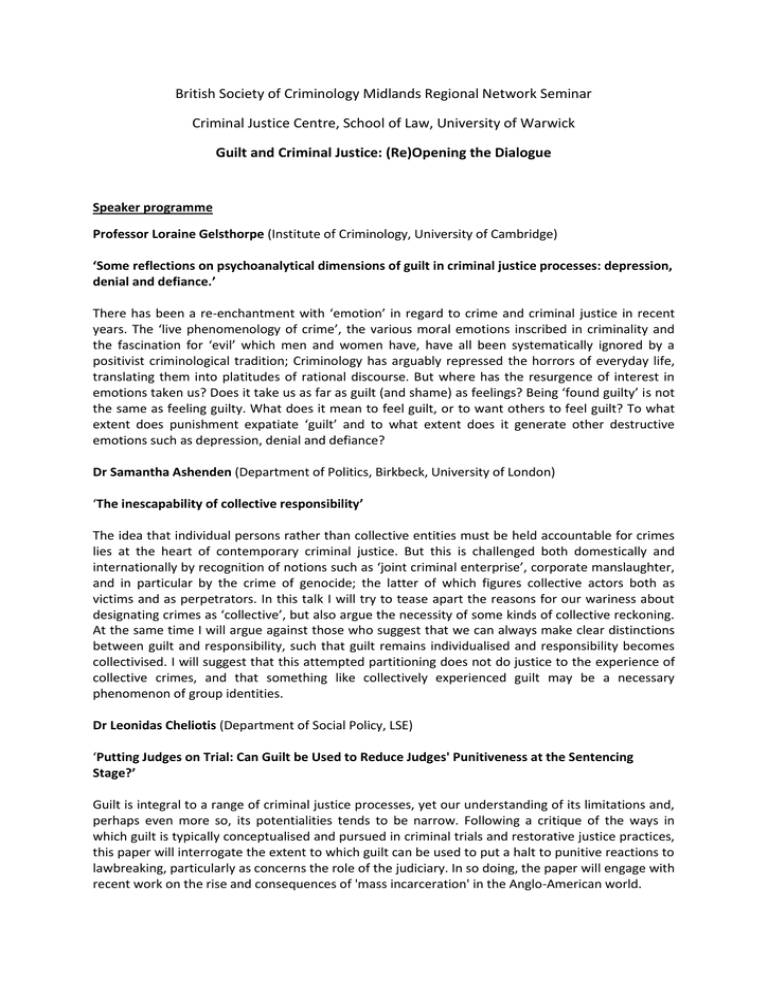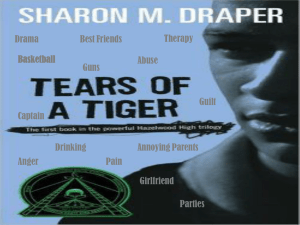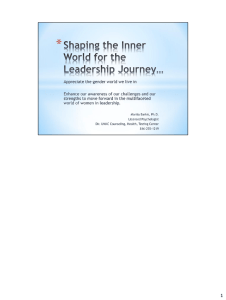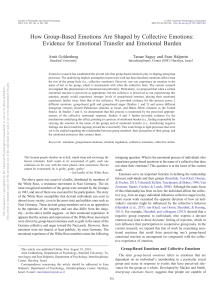British Society of Criminology Midlands Regional Network Seminar
advertisement

British Society of Criminology Midlands Regional Network Seminar Criminal Justice Centre, School of Law, University of Warwick Guilt and Criminal Justice: (Re)Opening the Dialogue Speaker programme Professor Loraine Gelsthorpe (Institute of Criminology, University of Cambridge) ‘Some reflections on psychoanalytical dimensions of guilt in criminal justice processes: depression, denial and defiance.’ There has been a re-enchantment with ‘emotion’ in regard to crime and criminal justice in recent years. The ‘live phenomenology of crime’, the various moral emotions inscribed in criminality and the fascination for ‘evil’ which men and women have, have all been systematically ignored by a positivist criminological tradition; Criminology has arguably repressed the horrors of everyday life, translating them into platitudes of rational discourse. But where has the resurgence of interest in emotions taken us? Does it take us as far as guilt (and shame) as feelings? Being ‘found guilty’ is not the same as feeling guilty. What does it mean to feel guilt, or to want others to feel guilt? To what extent does punishment expatiate ‘guilt’ and to what extent does it generate other destructive emotions such as depression, denial and defiance? Dr Samantha Ashenden (Department of Politics, Birkbeck, University of London) ‘The inescapability of collective responsibility’ The idea that individual persons rather than collective entities must be held accountable for crimes lies at the heart of contemporary criminal justice. But this is challenged both domestically and internationally by recognition of notions such as ‘joint criminal enterprise’, corporate manslaughter, and in particular by the crime of genocide; the latter of which figures collective actors both as victims and as perpetrators. In this talk I will try to tease apart the reasons for our wariness about designating crimes as ‘collective’, but also argue the necessity of some kinds of collective reckoning. At the same time I will argue against those who suggest that we can always make clear distinctions between guilt and responsibility, such that guilt remains individualised and responsibility becomes collectivised. I will suggest that this attempted partitioning does not do justice to the experience of collective crimes, and that something like collectively experienced guilt may be a necessary phenomenon of group identities. Dr Leonidas Cheliotis (Department of Social Policy, LSE) ‘Putting Judges on Trial: Can Guilt be Used to Reduce Judges' Punitiveness at the Sentencing Stage?’ Guilt is integral to a range of criminal justice processes, yet our understanding of its limitations and, perhaps even more so, its potentialities tends to be narrow. Following a critique of the ways in which guilt is typically conceptualised and pursued in criminal trials and restorative justice practices, this paper will interrogate the extent to which guilt can be used to put a halt to punitive reactions to lawbreaking, particularly as concerns the role of the judiciary. In so doing, the paper will engage with recent work on the rise and consequences of 'mass incarceration' in the Anglo-American world.








